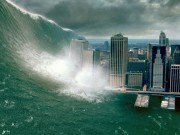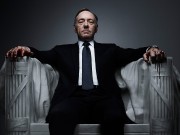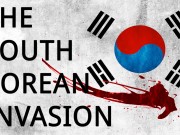It is rare for a major motion picture to be released while the director remains in custody; this custody may have added to the political strife that is featured in The Ghost Writer. This Roman Polanski 2010 political thriller is a first for the troubled director, yet features many of the traditional Polanski signatures that have made him a major figure in cinema for six decades.
An unnamed protagonist (will be referred to as Ghost) (Ewan McGregor) is hired to pick up where the previous ghost writer left of on former British Prime Minister Adam Lang’s (Pierce Brosnan) memoirs. The previous ghost writer was found dead and washed ashore. Ghost is invited to a secure home where he continues to work on the memoirs with the Minster’s assistant, (Kim Cattrall) and his wife (Olivia Williams).
News of rumors about Langs’s illegal activities regarding suspected terrorists creates a stir among peace protesters and prevents Lang from returning to the UK. Ghost begins to find clues left by the previous ghost writer that point towards many of the secret allegations that have surrounded Lang.
The Ghost Writer is a stark contrast to many of Polanksi’s previous films, yet contains many similar signatures. This is his first political film, one that features several parallels to current affairs. Yet the conspiracy that surrounds the film has a similar tone to Chinatown, The Ninth Gate, and Frantic. Each of these films, including The Ghost Writer, all include a male protagonist whose character is an expert that is called upon for a unique and difficult task that leads to a dangerous conspiracy.
What is drastically different about the protagonist in The Ghost Writer, is that he is unnamed and his history is unknown. He is a ghost in all forms of the word. Previously, male protagonists in Polanski’s films are well known for their expert status and their identity is well known.
There is a smooth and elegant demeanor to Polanski’s thriller and the musical score supports much of the suspense and thrills. The score is very much in the vein of previous Polanski scores and has a classical aura that is reminiscent of Rosemary’s Baby. Close up shots of important objects and lengthy dolly tracking scenes are ever present. Polanski often frames characters in very vertical scenes, hiding information as these characters perform from a distance.
While the film features many excellent scenes than support the thriller’s plot and tone, there are many issues that prevent the film from having the seemlessness to make it a great film. The film is very much dialogue heavy, and with the abundance of British actors, there is this mumbling that is ever constant, making it slightly difficult to hear all the dialogue. Some of the plot twists are far too convenient, such as secret information too easily found on Google.
There are many obvious parallels in The Ghost Writer. One being to former Prime Minister Blair and even the Bush administration, with one particular scene with a character that is very much like Condoleezza Rice. Another is the fact that Polanski completed the film in custody during his possible extradition back to America, much like how Lang must remain in American to prevent being detained for international crimes. Even the company in the film is similar to Halliburton.
The Ghost Writer is a front-runner for one of the best films of the year at this point, particularly for the score. Polanski, at least behind the camera, was on top of his game, proof that he is one of the few living masters of suspense. It is hard to imagine how this film would have turned out if post-production was not completed in custody, anger and strife toward several governments is certainly clear.








